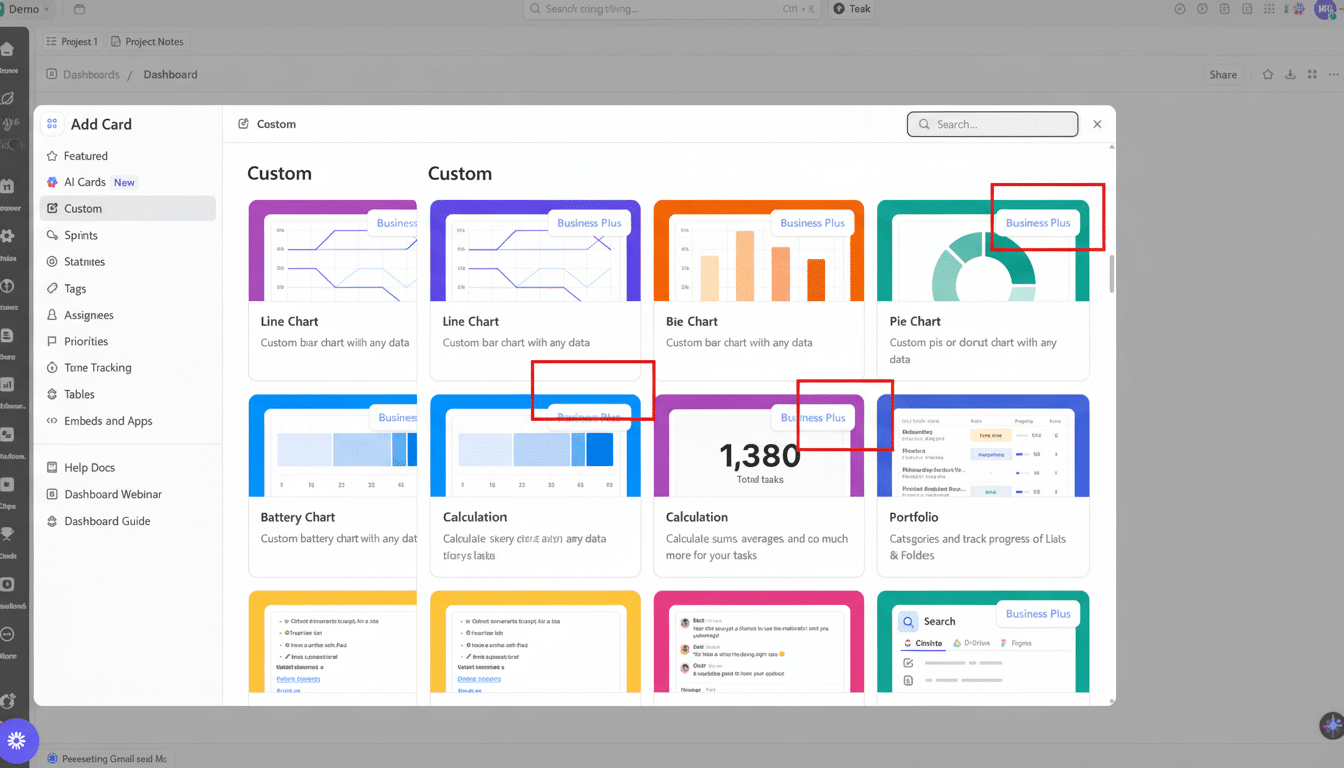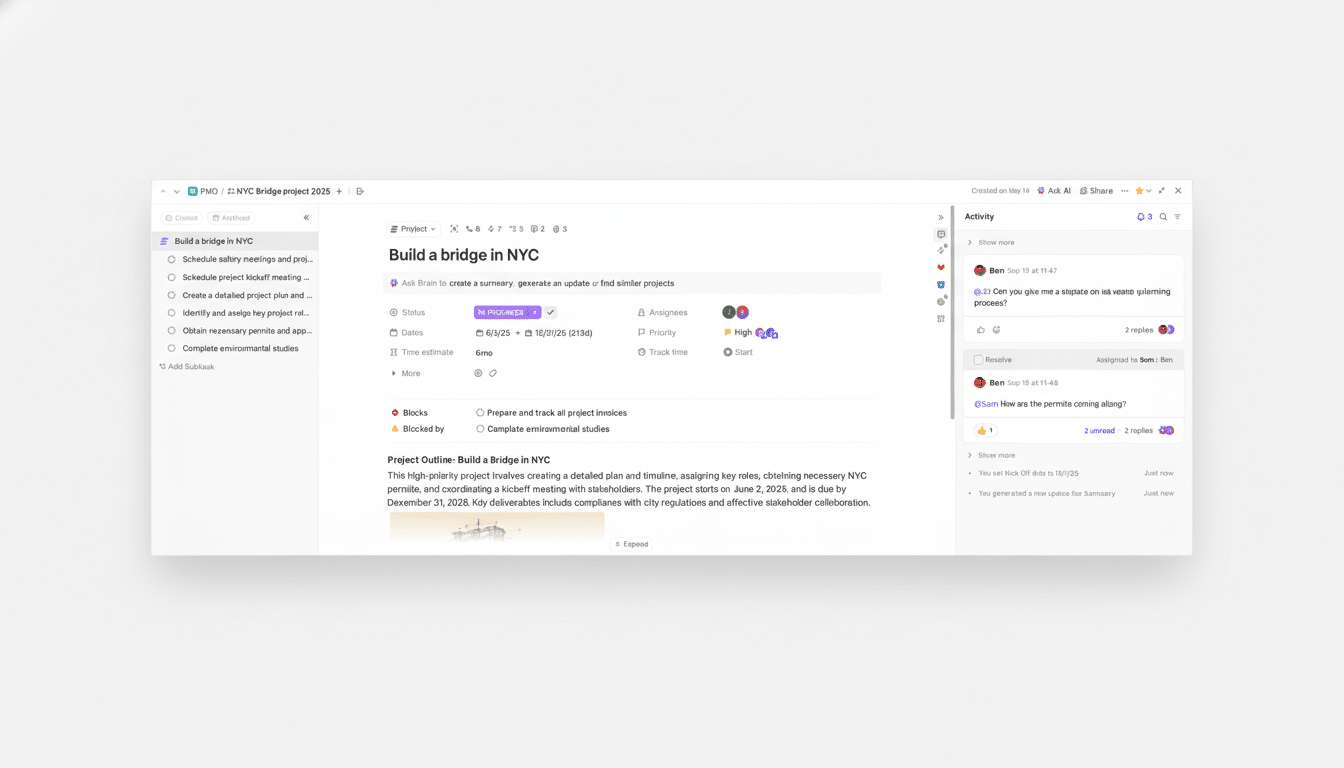Now it’s planning a big 4.0 update with an AI assistant in tow, as part of its quest to merge docs, tasks, and chat into one fluid workflow—and take the hurt away from competitors like Slack, Notion, and Microsoft Teams.
It includes two different agents that inhabit the platform, combining proactive answers inside conversations with a general-purpose “Brain” that can schedule work, create content, and perform tasks.

What ClickUp’s New AI Actually Does Across the Platform
The first agent pops up wherever people talk. It searches threads for questions—think “Where is the Q4 roadmap?”—and answers by drawing from a company’s knowledge across connected tools including Google Drive, OneDrive, Figma, and Gmail. This is all about time to answer, not a better search box.
The second agent—Brain—is a creature of action. It’s able to draft text, schedule a meeting when everyone is free via their linked teams, add comments, create tasks, generate reports, and pull from the web or linked apps. It lives in the sidebar, so you can enhance a document, chat, or task in place without forcing a context switch.
ClickUp believes these agents are laced across navigation—users can jump among tasks, docs, channels, and an internal forum timeline without getting lost along the way. That consistency is essential if AI is to move beyond summarization and actually make work happen.
Why It’s a Big Deal vs. Slack and Notion
Slack, now owned by Salesforce, followed Microsoft’s lead by increasing availability for Slack AI in 2024 with recaps, search, and summarization. Notion launched Notion AI to accelerate writing and knowledge access across docs and wikis. Microsoft is continuing to integrate Copilot into Teams, Office, and Windows. The battle lines are drawn: less tabbing, quick answers, and action-y AI.
ClickUp’s pitch is consolidation. It already provides task tracking, docs, calendar, and chat. The new assistants work to mirror handoff-friendly Slack- and Teams-style communication while leveraging ClickUp’s work graph, so AI can digest the summary of a meeting and also post its follow-up tasks, set dates for their completion, ping their owners—everything—right inside the same system.
Qatalog Deal Supercharges Enterprise Search
Behind the scenes, ClickUp cites its acquisition of Qatalog, an enterprise search startup with backing from investors including Salesforce Ventures, Atomico, Mosaic Ventures, and Possible Ventures. Qatalog had raised over $29.5 million and focused on connecting fragmented knowledge into a queryable map of people, projects, and documents.

That backbone is evident in how ClickUp’s proactive agent surfaces answers across tools—no brittle manual tagging involved. For companies swimming in duplicate docs and siloed chats, being able to thread context from Gmail threads, Figma designs, and Drive folders into a single response is the real unlock—not just another chatbot.
Meetings and Channels Go AI-Native With Syncups
ClickUp has been working to catch up on product features in communications. Now, after implementing AI-prompted summaries and built-in live video and audio calls labeled Syncups, the company is bringing a button for Syncup into each of its channels. An AI note-taker can automatically capture, transcribe, and share notes and then turn decisions into action items without ever exiting the thread.
The calendar also gets smarter. If something is a priority, the system can reshuffle meetings and work blocks to accommodate it, instead of supervisors playing Tetris with calendars. A new, internet-style team dashboard: see channel updates alongside progress analytics and time-off visibility so leaders always have a quick pulse on what’s moving versus what’s stuck.
Business Traction And Competitive Threat
ClickUp says it has achieved more than $300 million in annual recurring revenue, and leadership has signaled interest in an IPO within two years. The company has raised over $537 million in funding from investors that include a16z, Tiger Global, Craft Ventures, and Lightspeed, according to Crunchbase data.
Numbers aside, the math is simple: If AI can answer questions where you ask them and trigger work where it lives, fewer teams will put up with fragmented stacks. That’s a threat to single-purpose chat or wiki tools, and an opportunity for platforms that can attach conversations to delivery.
What to Watch Next as ClickUp Rolls Out AI Features
Companies will press on governance and reliability. Anticipate concerns about data residency, the audit trail, and how the system reconciles hallucinations when combining internal and web sources. Admin controls, a library of sources it cites, and an opt-in policy will dictate whether this AI makes its way to regulated teams or remains locked in pilots.
If ClickUp can regularly convert a channel question into an authoritative answer with source doc links, even open a task, assign it to someone, and log the follow-up, well, then it will have accomplished something competitors are still fumbling through. In crowded work piles, practicality trumps novelty. Now the race is to turn AI into something that actually moves the work.

